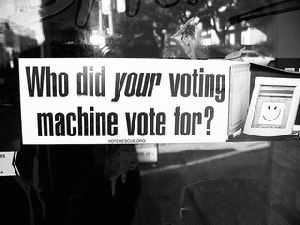Every once in a while I treat myself to a good read of the New York Times, as opposed to a scan or quick read of articles that jump out at me. Many of these, unsurprisingly, concern election integrity, since I am on their list to automatically receive relevant articles.
Today Gail Collins published a somewhat tongue-in-cheek op ed "Rules to Vote By," criticizing the plagiarism of policy solutions offered by various candidates for the 2014 elections. I wrote a reply that defended the borrowing of ideas from others as long as the originators were given credit, but what if the idea came from Singapore instead of Thomas Jefferson?
Inevitable controversy, usually the lifeblood of democracy, some believe, but lately I think most of us will agree that it's a bit stretched when Congress receives a popularity rating lower than that for cockroaches (9 percent, the last I heard, for Congress, that is). "deathblood of democracy" it seems, these days.
Then, because I believe that comments on articles are sometimes even better or more interesting than the articles themselves, though I have even less time to peruse them, I opted for the New York Times's favorite comment on Collins's op ed, most articulately written. It stated that those to blame are not the plagiarizers but those who never read about them--the "men on the street" who [I am paraphrasing] don't know the difference between Joe Biden and Mitch McConnell but vote anyway.
Theirs is the blame, she wrote. Blame the people.
So I swallowed hard to talk back to a Grey Lady fave but did. I wrote that she was correct in implicitly emphasizing the importance of an informed electorate, but instead of blaming the uninformed--she even bluntly faulted them--she needed to dig deeper and ask "why" once she thinks to have pinpointed "whom."
And what of the plus-or-minus 100 million or so who don't vote at all?
I told her about the Election Integrity's emphasis on the importance of educating the people via many forms of outreach. You don't just blame and stop there to applause from Times editors as well as even some readers. One said that she should be on the editorial board herself. )-:
That had been the only editors' pick. Suddenly several more popped up. I was glad, because usually the editors choose better.
Disclaimer: The Times has provided the [educated] public with important information on election and voting issues and I often quote from the Grey Lady herself in my writing.
*****
Just as a quick segue, the "plagiarizer" whom Collins cited is the Georgia candidate for the U.S. Senate David Perdue, who "plagiarized" a proposed economic policy from Lee Kuan Yew, the ex-prime minister of Singapore. Perdue's staff should have rewritten it, the usual procedure, wrote Collins. "It's sort of weird when you adopt precepts from a guy who used to have citizens beaten with canes for vandalism."
Now David Perdue is the first cousin of former Georgia [Republican] Governor George Ervin "Sonny" Perdue III, who in Election 2002 triumphed against his opponent Roy Barnes even though Barnes had been ahead in the polls by 11 percentage points. Overnight, Perdue forged ahead by sixteen points, winning the election by 51 percent and thus becoming the first Republican governor of Georgia since the Reconstruction.
Collins didn't add that information, nor write about David Perdue's opponent, the incumbent Saxby Chambliss, who originally got into office in that same 2002 election in Georgia by defeating the popular incumbent U.S. Representative Max Cleland, an Iraq war veteran who lost three limbs while fighting for his country's foreign policy of the time. Cleland's pre-election poll totals exceeded Chambliss's by 5 points, but then, courtesy of another good-old "overnight surprise," Chambliss somehow surged ahead to a 53 percent upset.
(Note: You can view every article as one long page if you sign up as an Advocate Member, or higher).






